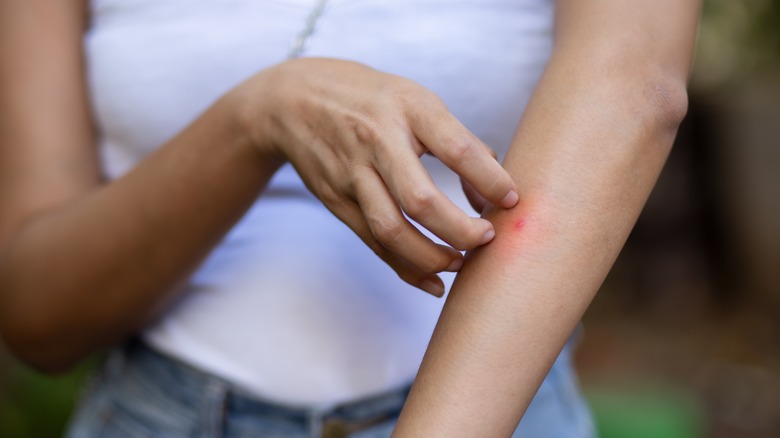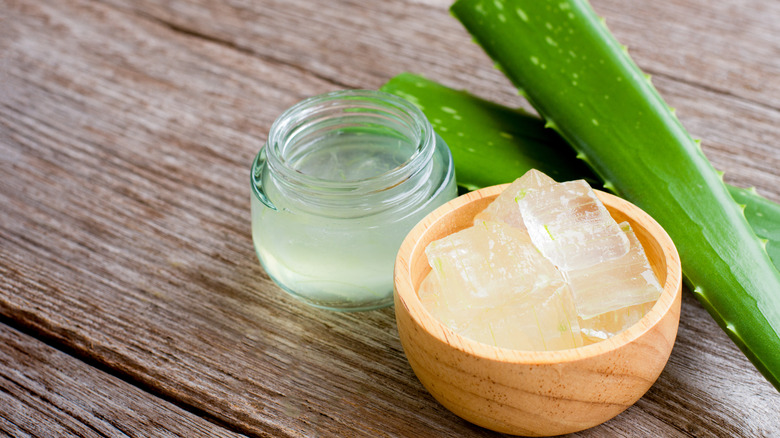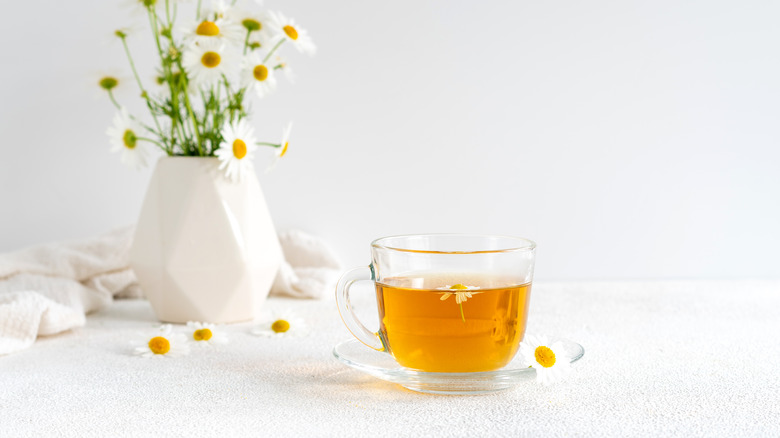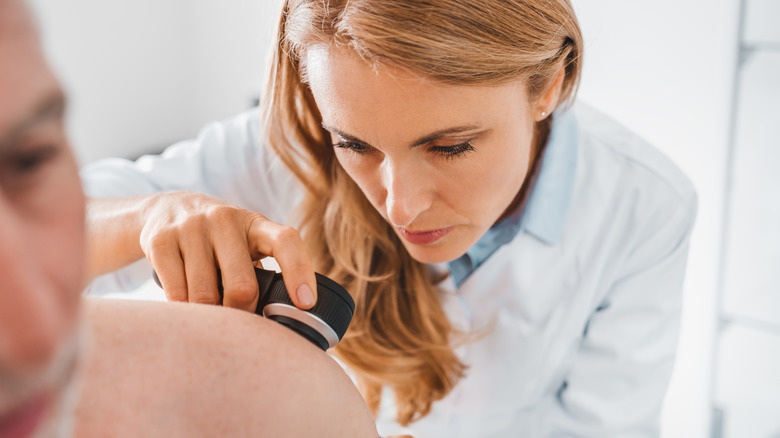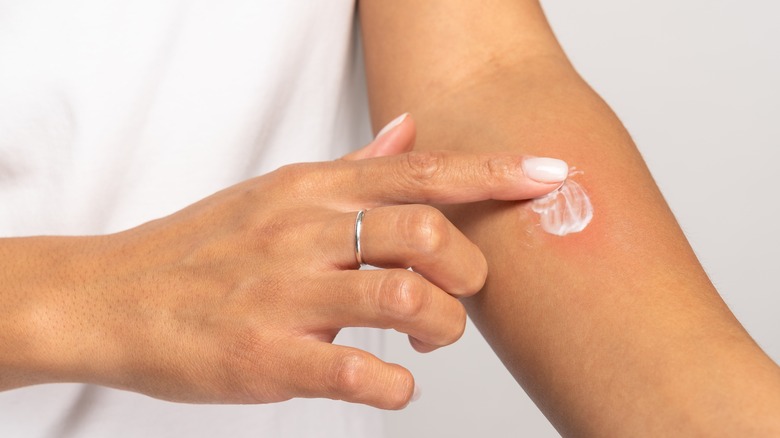Home Remedies For Mosquito Bites
According to the United States Environmental Protection Agency (EPA), there are around 200 mosquito species in the United States. In most of the world, mosquitoes are famous for biting. However, only female mosquitoes bite since they require blood to produce eggs (via the Centers for Disease Control and Prevention). Some mosquitoes can be vectors, meaning they spread pathogens through their bites. Usually, the type of mosquito determines the type of pathogens they carry. Anopheline mosquitoes, for example, carry malaria, while Culex mosquitoes carry West Nile fever (via the World Health Organization). Although mosquitoes carry diseases, the climate in the United States makes it unfavorable for the mosquito species that carry the worst pathogens (via Medical News Today).
Most mosquito bites can cause your skin to itch as their main symptom, as the Cleveland Clinic explains. The process begins when a small amount of saliva is deposited when a mosquito bites you. The body registers this saliva as an allergen. In response, the immune system sends histamine to the affected area to remove the allergen, causing itchiness and an inflamed bump at the site.
Medications are not usually needed for mosquito bites, but various home remedies are available. For example, many people place an ice pack on the affected area, which helps to reduce inflammation and itch after a mosquito bite, according to Medical News Today. Beyond using ice, there are many more home remedies available.
Aloe vera
According to a 2020 review published in the journal Molecules, aloe vera is a traditional treatment for insect bites and contains antimicrobial and anti-inflammatory properties. These anti-inflammatory properties can also help soothe itching, according to Mather Hospital. In another 2014 study published in the journal Pharmacognosy Reviews, aloe vera gel showed very good results in promoting wound healing by improving blood circulation in the affected area and preventing cell death around a wound. Healthline agrees that aloe vera has been proven to speed healing, making it a suitable treatment for bug bites.
Despite the benefits, topical aloe vera might irritate your skin, and some people may be allergic (via WebMD). It's best to consult a certified dermatologist for further assistance on how much aloe vera to use. According to WebMD, the percentage of aloe vera varies in creams and gels, with some products containing as low as 0.5% aloe vera. Alternatively, if you have an aloe vera plant in your home, you can cut one of the outer leaves close to the stem and use a knife to peel off the outer skin, then mash or puree the inner gel.
Honey
Honey has around 200 distinct chemical compounds, including phenolic acids, enzymes, flavonoids, vitamins, minerals, and proteins, according to a 2019 article published in the International Journal of Food Properties. The study attributes honey's antioxidant and anti-inflammatory properties to this wide range of flavonoid and phenolic acid compounds. According to the Cleveland Clinic, unprocessed honey also contains an enzyme called catalase, which relieves minor inflammation when applied to a mosquito bite. For this reason, you might experience reduced itching and irritation after applying honey to the bitten area. The publication also suggests putting a bandage over the bite after applying honey to avoid any sticky messiness.
Another 2018 review published in Oxidative Medicine and Cellular Longevity explains that honey's exact method of action toward inflammation is still being researched. However, the source credits honey's inherent inflammatory mediators, enzymes, and proteins as a significant factor in the substance's ability to fight inflammation.
Chamomile tea
Chamomile is one of the oldest and most widely used medicinal plants worldwide. According to a 2010 study published in the journal Molecular Medicine Reports, chamomile offers a wide range of anti-inflammatory and antioxidant skincare benefits — it calms the skin and provides relief from minor wounds. These medicinal benefits are attributed to the terpenoids and flavonoids found in the dried flowers, per the study.
According to the Cleveland Clinic, chamomile is one of the various home remedies that can help reduce itching and inflammation after a mosquito bite. The clinic recommends steeping a chamomile tea bag for 20 minutes or until you see a rich gold-brown color. Next, rid the teabag of excess water and press it against the mosquito bite for at least 10 minutes.
Despite its skincare benefits, chamomile can cause allergic reactions in certain people. Although these incidences are rare, they're more likely in people who are allergic to plants like ragweed, daisies, or marigolds, according to the National Center for Complementary and Integrative Health.
When to see a doctor for a mosquito bite
According to the Mayo Clinic, most mosquito bites heal within a few days, but it's important to consult with your doctor if the bite leads to a high fever, severe headaches, and body aches. These are warning signs of a severe infection. As flu-like symptoms are uncharacteristic of regular mosquito bites, you should consult a health expert if you develop such symptoms (via Healthline). According to Medical News Today, other severe symptoms to look out for include breathing problems, nausea, vomiting, and dizziness. Some people may also develop an allergic reaction leading to life-threatening situations like anaphylactic shock in extreme cases.
According to the National Health Service (NHS), apart from the tell-tale symptoms of infection, it's important to consult a doctor if the redness or swelling spreads beyond 10 centimeters of the affected area or if the mosquito bites are in your mouth, throat, or eyes. Regarding treatment, your doctor may suggest acetaminophen or ibuprofen for any pain or discomfort, or antihistamines to reduce itching and swelling. If these medications don't work, your doctor might prescribe a stronger alternative like steroids.
Tips to prevent mosquito bites
Even if mosquitoes may not be present in your current environment, the situation isn't the same everywhere. When traveling out of your state or country, it's best to research the environment of your destination beforehand. This way, you'll have all the necessary preventative items from first aid to clothing. The Centers for Disease Control and Prevention recommend wearing long-sleeved shirts and long pants treated with 0.5% permethrin to cover your legs and hands when outside in mosquito-prone environments. If you plan to sleep outside, mosquito nets should be used.
The prevention of mosquito bites can be more controlled inside your home than outside. However, much of this rests on keeping your home and the surrounding environment hygienic. For example, it's vital to drain standing water in gutters or other areas that retain pools of water, since they're an excellent breeding ground for mosquitoes around your home (per the EPA). When eliminating these breeding areas, try to seal gaps in walls, windows, and doors to prevent mosquitoes from entering.
Insect repellants can also help prevent mosquito bites. The American Academy of Dermatology Association recommends products containing 20% to 30% DEET on exposed skin and clothing. Also, ensure you follow all instructions on any products before use.
